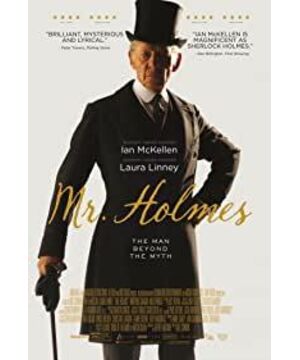The greatest wish for life is that I can abandon this world before reason can abandon me. Reason-the most precious gift given to me by this creation has always supported me to this day in the waves of life. And it was this man named Sherlock Holmes who first made me realize its power. His story tells us that people can rely on the rational insights in their minds to faintly lift the clouds and see the sun to help the poor and help the poor to achieve justice, and this process can also bring people incomparable excitement and satisfaction. Amazing!
However, when this rational incarnation lived to be 93 years old, he was also betrayed by small gray brain cells—he couldn't remember anything. This one stalk alone is enough to make my heart dying. Fortunately, his reasoning ability is still as strong as ever. Then the plot becomes: the old Holmes tries to reason out the real reason why he gave up his detective career and retired in the countryside in the memory of the fragments, inspired by his new partner.
I was attracted by this process of exploring myself back in the past, but I didn't like the answer he found, because in my opinion, it was a not-so-Holmes answer.
In Ann's case, Holmes did what he should and can do: find out the truth and try to prevent further harm. Ann's suicide, the loneliness she couldn't get rid of, was not Holmes' responsibility. Loneliness cannot be soothed with the company of strangers, patient listening, and white lies. Choosing to die because of loneliness is not a difficult human nature puzzle. Sherlock Holmes lived with loneliness all his life. How could he be so puzzled because of this incident, and then he lost his mind? This is hard for me to agree with.
Holmes is certainly not a rational machine, but he has never become a slave to emotion. He is a consulting detective, he is not and never wanted to be a savior. He knows that his duty is to use reason to solve the riddles created by malice and misunderstanding, not to eliminate all suffering and see the end of human nature. In his words, "This is not my responsibility to my client." This film attempts to lift Sherlock Holmes from this perspective, and it seems to me a failure.
And letting the detective’s rationality fail in the collision with the female’s mind, thus waking up to his own limitations, is also too simple for the detective’s self-confidence. Reason is certainly the life and work of Holmes, but he never really regarded it as omnipotent. "I have seen too many worlds, and I don't know that the impression a woman gets may be more valuable than the judgment of an analytical reasoner." He once said this to Mrs. Saint Clair. I believe this is not purely out of politeness or self-humility. His self-confidence stems from his confidence in his ability to use reason, not his belief in the ability to solve everything.
It is arrogance, arrogance, and Madonna's disease to regard the irreparable pain of others as one's own unshirkable responsibility. He believes that rationality is omnipotent and that solving puzzles is equivalent to solving problems. He is blind, hard-headed, and deadly rational. And Holmes, I believe that even if he lives to be 93 years old, he will not try to transcend the limitations of reason he has known long ago, play the role of God, and encounter the collapse of the faith of this deathly rationalist.
The screenwriter of this film, I cannot congratulate you.
View more about Mr. Holmes reviews











